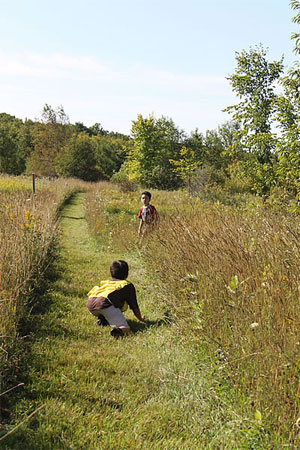In Instincts for Survival, students role play animals in predator-prey relationships while trying to find enough “food” and “water” to
survive. Researching their assigned animal role before coming to MCOEC and writing “A Day in the Life of” their animal


story once they return to their home school helps students deepen their understanding of the interactions between animals, between animals and their environment, and human impacts on the environment.
During the Ecology and Geology Hikes, students explore the Mono Cliffs environment and learn firsthand about biodiversity, interactions in forest and field ecosystems and ways to minimize human impact on their environment. Students are given time to walk or sit quietly in the woods and so gain appreciation for the beauty and calm that natural spaces have to offer, which in turn strengthens their appreciation and sense of connectedness to natural spaces.
The Pond study program teaches students about the biodiversity and interactions in this aquatic ecosystem. The often-overlooked freshwater invertebrates are studied, and specimens are identified and classified by their roles in the pond ecosystem.
Action: Schools will, “
develop professional learning communities to share effective practices about pedagogical strategies that support learning and teaching about the environment” (Acting Today, Shaping Tomorrow, p.14).
The staff at MCOEC model environmental stewardship as they lead by example. Website resources, displays, and pre- and post-trip communications with visiting teachers are examples of the ways in which the staff share information about environmental teaching and
learning with the teaching community. As a certified Platinum EcoSchool, MCOEC often serves as a model to visiting schools, as staff offer suggestions and collaborate in order to help them gain or advance EcoSchool status for their home school. MCOEC’s professional
learning community includes teacher candidates and University cooperative education interns from a variety of subject areas who gain experience delivering environmental programming to school groups.